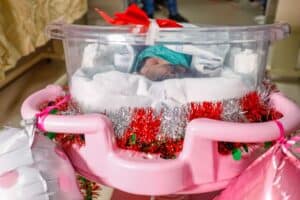ANC Women's League general secretary slams 'blessers' and 'Ill-conceived cultural practices' for perpetuating teenage pregnancy.

African National Congress Women’s League (ANCWL) secretary-general Nokuthula Nqaba has called on teachers, parents and society at large to do what they can to address the scourge of teenage pregnancy.
Nqaba said this on Wednesday, after commemorating Women’s Day last week.
South Africa currently marks Women’s Month every August and this year’s theme is ‘Celebrating 30 Years of Democracy Towards Women’s Development’.
‘Vicious cycle of poverty’
However, Nqaba said it was difficult to mark the progress made because the league was perturbed by the “alarming statistics of teenage pregnancy where children are prematurely becoming parents when they still have to be parented themselves”.
Recent research found over 105,000 South African girls gave birth between April 2022 and March 2023.
According to research, between April 2017 and September 2021, the number of births to child and adolescent girls between 10 and 14 years of age increased by 48.7%.
Nqaba said teenage pregnancy traps girls in a vicious cycle of poverty, lack of educational prospects and the persistence of under-development.
“Our government is already under enormous financial pressure as a result of the global fiscal instability and the consequence of teenage pregnancy will certainly result in a massive increase in digging deeper into the state revenue.
“Scientific evidence informs us that both KwaZulu-Natal and the Eastern Cape Provinces are leading the pack with the highest number of girls as young as age ten, who have given birth in the past few months.”
ALSO READ: Limpopo education department urged to investigate after Grade 10 pupil gives birth in school toilet
Nqaba said social ills contribute to the teenage pregnancy problem and called on all sectors of society to work together to address them.
“The degeneration in morality conjoined with socio-economic disparities and socially misconstrued cultural norms and practices have been contributing factors to the high prevalence of teenage pregnancy in the country.
“We therefore advocate for constant awareness from the foundation phase of our education system, to ensure gradual nurturing as we raise both the girl and the boy child.”
It begins at home
Nqaba said South African girls saw a lack of adequate care, parental supervision, and education on sexual reproductive health, “which remains a forbidden subject in some African households and that lingers to unfortunate circumstances.”
She added the continuation of patriarchal tendencies and “ill-conceived cultural practices” play a role and should be “exclaimed with profound contempt as they purport our cultural heritage whilst leading to repugnant repercussions to young women”.
This includes the normalisation of ‘blessers’.
“The socially acceptable norm of ‘blessers’ where elderly men entice young girls with money, expensive alcohol, opulent clothing and other exorbitant accessories is a perpetual factor to social deviance.”
Nqaba said the league would assert its unshaken position against any form of injustice that would derail the future of South African children.
ALSO READ: Eastern Cape gets SA’s first contraception and HIV kit vending machine
Teen moms likely to be abuse or coercion victims
Democratic Alliance (DA) National Deputy Spokesperson on Social Development Alexandra Abrahams revealed that among the 122 000 pregnancies recorded in the last financial year, 119 587 could be attributed to girls aged between 15 to 19 years. 2 716 young girls aged 10 to 14 fell pregnant during the same period.
Abrahams said some of these were likely victims of abuse or coercion.
“It stands to reason that given the country’s extremely high rate of GBV, many of these teen mothers would have suffered abuse or coercion and that the perpetrators should be brought to justice before they inflict suffering on another victim,” she said.
Dropouts and poverty
According to the Department of Basic Education, approximately 33% of girls who prematurely become mothers drop out of school.
This saddening fact confines girls to the cycle of poverty, lack of proper education, deprivation of a good childhood and teenhood, widening of gender gaps, and jeopardising career opportunities.
Poor access to contraceptives, gender inequalities, sexual taboos, high levels of gender-based violence, and inadequate sex education form part of the leading factors that drive up teenage pregnancy.
Additional reporting by Enkosi Selane






